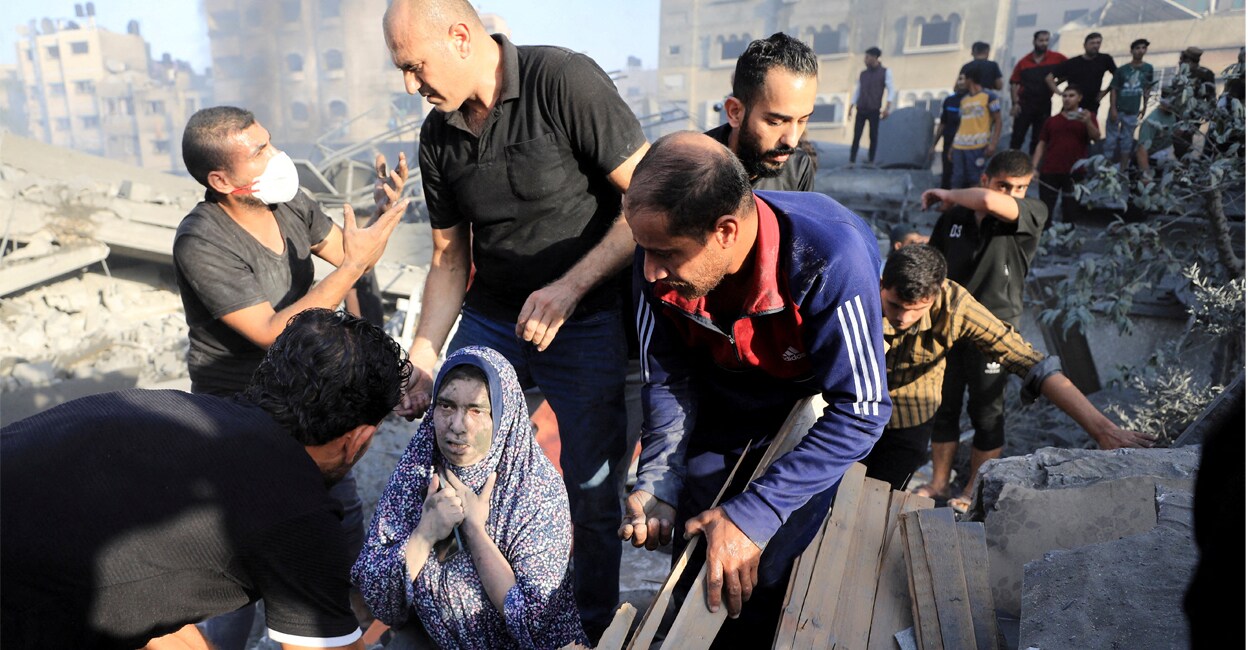










Adil Mismah, the Nukhba Company Commander of Deir al-Balah, has been killed by Israeli Defense Forces [a163f419]. He was involved in Hamas' October 7 invasion and attack on communities surrounding Gaza [a163f419]. The IDF also destroyed a Hamas launch post, eliminated a cell of terrorists, and killed a terrorist launching rockets in Khan Yunis [a163f419]. The conflict between Israel and Hamas continues, with Hamas firing rockets at Israel on New Year's Day [a163f419]. The IDF has stated that there will be no 'happy' new year until all hostages held by Hamas are released [a163f419]. The Gaza Health Ministry reports that 21,978 Palestinians have been killed since the start of the conflict on Oct. 7 [a163f419]. Israeli air defense systems intercepted 18 out of 27 rockets fired by Hamas at Israel [a163f419]. The IDF conducted airstrikes on Hamas and Islamic Jihad targets and found large amounts of weapons in Shejaiya [a163f419]. The IDF naval troops also struck Hamas terror targets and supported ground troops in Gaza [a163f419].
The conflict between Israel and Hamas continues to escalate, with Israeli forces carrying out a second ground raid into Gaza [626ad076]. During an attack on October 7, 2023, Hamas militants successfully breached Israel's border defenses, exposing vulnerabilities in the country's security system [84c41615]. The militants targeted communication towers and disabled key detection and warning systems, using snipers and commercial drones armed with explosives [84c41615]. This allowed them to advance deep into Israeli territory with little resistance, resulting in the deaths of at least 309 Israeli soldiers [84c41615]. The attack highlighted the mistake of placing key command centers close to the border and underestimating the enemy [84c41615]. The Israeli military struggled to respond to the unprecedented scale of the attack, raising questions about the effectiveness of Israel's border security system and the government's decision to withdraw troops from the area [84c41615]. The ongoing conflict has caused widespread destruction and displacement, with over a million people fleeing their homes [626ad076]. Arab countries and the United Nations have called for an immediate ceasefire to address the humanitarian crisis in Gaza [626ad076].
Recent information from The Business Standard reveals that Israeli military and intelligence were aware of Hamas's plans for their October 7 attack more than a year ago [285682d7]. However, they failed to acknowledge the likelihood of the attack, raising questions about the effectiveness of Israel's intelligence gathering and security measures [285682d7]. The attack, which resulted in the death of over 15,000 Palestinian civilians and the arrest of thousands more, followed a meticulously detailed plan outlined by Hamas [285682d7]. The document, codenamed 'Jericho Wall' by Israel, has raised concerns about potential leaks within the Israeli security establishment and how Hamas gathered its intelligence [285682d7]. Experts initially dismissed the possibility of an attack of that scale by Hamas, but a warning from a veteran analyst with Israel's signals intelligence agency in July matched the content of the document [285682d7]. If the warnings had been taken seriously, Israel could have potentially prevented or mitigated the attacks [285682d7].
According to a report from The Jewish Voice, Hamas orchestrated a devastating attack on Israel by lulling the country into a false sense of security [d7d0de14]. The terror group planned the assault for over a year, with more than 3,000 terrorists storming the border fence from Gaza with detailed maps and battle plans [d7d0de14]. Hamas projected an economic focus rather than conflict, even collaborating with Israel against Palestinian Islamic Jihad, contributing to Israel's misconception and false sense of security [d7d0de14]. The tactics used by Hamas included acclimating the IDF to border crowds and creating a sense of complacency [d7d0de14]. The attack, which occurred on October 7, 2023, targeted specific military bases and civilian towns as far north as Rehovot and as far east as Beersheba, resulting in significant damage and casualties [d7d0de14].
In a recording aired by Israel's public broadcaster Kan, the head of Israel's domestic security agency, Shin Bet, vowed to hunt down Hamas abroad [85933f63]. He stated that Israel will pursue Hamas in Lebanon, Turkey, and Qatar, even if it takes years, referring to this mission as Israel's 'Munich' [85933f63]. This comparison is made in reference to the country's response to the 1972 killing of 11 Israeli Olympic team members by the Palestinian Black September group [85933f63]. The recent attack by Hamas on the Gaza border, which resulted in the deaths of 1,200 people and the hostage-taking of around 240 individuals, has led Israel to vow to annihilate Hamas [85933f63]. Hamas leaders are known to reside in or frequently visit Lebanon, Turkey, and Qatar, and have received protection from various countries over the years [85933f63]. The recording also mentioned a previous attempt by Israeli Mossad agents to poison then-Hamas leader Khaled Meshaal in Jordan in 1997, which was unsuccessful [85933f63].
Israel's domestic security service plans to launch a security operation against members of the Palestinian Hamas militant group who reside outside of Gaza [9e7f9e9f]. Israel will hunt down the militants anywhere in the world, including Turkey, Lebanon, and Qatar [9e7f9e9f]. The operation is in response to an attack launched by Hamas against Israel, resulting in the death of 1,200 Israelis and the taking of around 240 hostages [9e7f9e9f]. Israel's campaign against Hamas has sparked condemnation due to its alleged indiscriminate tactics and heavy civilian casualties [9e7f9e9f]. The security operation is compared to a targeted assassination campaign Israel launched in response to the 1972 Munich massacre [9e7f9e9f]. The campaign targeted members of Black September and operatives of the Palestine Liberation Organization [9e7f9e9f]. Israel's intelligence has been drawing up plans for the global assassination campaign against Hamas since the October 7 attack [9e7f9e9f].
In a recent analysis by Amos Yadlin and Udi Evental in Foreign Affairs Magazine, they highlight the failure of Israel's security doctrine and institutions in keeping its citizens safe [2dbcefaf]. The surprise attack by Hamas on October 7 resulted in the deaths of around 1,200 people and the kidnapping of 240, including children and elderly individuals [2dbcefaf]. The attack exposed the overreliance on deterrence, the failure to address the buildup of Hamas forces in Gaza, and the inadequate defensive capabilities to counter an aboveground invasion [2dbcefaf]. The intelligence community also failed to properly comprehend Hamas's nature and intentions [2dbcefaf]. The authors argue for a paradigm shift in Israel's defense institutions and security strategy, prioritizing national security interests, bringing the hostages back home, and preventing further terrorist attacks [2dbcefaf]. They emphasize the need for a decisive response to the Hamas attack, the importance of removing Hamas from power in Gaza, and the establishment of a legitimate governing authority in Gaza [2dbcefaf]. Israel will require the support of partners who share its strategic interests, including military funding and support, humanitarian assistance, and diplomatic efforts [2dbcefaf]. Israel must also restore trust in its institutions among its citizens, initiate a dialogue with Arab countries and international partners, and reassess and enhance its security strategies [2dbcefaf].
Social security data in Israel has revealed a more precise picture of Hamas's October 7 attack on Israel, confirming the unprecedented scale of the violence [d67edb06]. The final death toll from the attack is now thought to be 695 Israeli civilians, including 36 children, as well as 373 security forces and 71 foreigners, giving a total of 1,139 [d67edb06]. The violence began when armed men from the Palestinian Islamist movement broke through the militarized border with Gaza on Shabbat, the last day of the Jewish holiday of Sukkot [d67edb06]. It took more than three days of heavy fighting for the Israeli army to regain control [d67edb06]. Israel has vowed to destroy Hamas in response to the attack. Its air and ground offensive has killed more than 18,700 people, mostly women and children, according to figures from the health ministry in the Hamas-run Gaza Strip [d67edb06]. The identities and ages of civilian victims are available via Bituah Leumi, Israel's social security agency [d67edb06]. The data gives a clear picture of the scale of the atrocities at the Supernova music festival in Reim where 364 people were killed [d67edb06]. However, it also invalidates some statements by Israeli authorities in the days following the attack [d67edb06]. The extreme nature of the violence can make it hard for responders to be accurate in their testimonies [d67edb06]. There were also 71 foreign victims on October 7, mostly Thai workers [d67edb06]. In the fighting to regain control of southern Israel, 58 police, 10 members of internal security service Shin Bet, and 305 soldiers were killed [d67edb06]. Israel also faces the ongoing trauma of some 250 hostages who were dragged back to Gaza in the attack, according to Israeli authorities [d67edb06].
A worldwide campaign of assassinations of Hamas leaders announced by senior Israeli officials is likely to be counterproductive, impractical, and ineffective, according to targets of previous assassination attempts [dc4490c0]. The new strategy was announced by Benjamin Netanyahu two weeks after the 7 October attacks launched by Hamas into southern Israel [dc4490c0]. The campaign, called Nili, would target senior leaders of the militant Islamist organization [dc4490c0]. However, critics argue that assassinations do not solve anything and may even strengthen the resolve of targeted individuals and their factions [dc4490c0]. They also question the practicality of the campaign, as Hamas leaders are primarily based in Qatar and Turkey, where assassinations would be difficult or impossible [dc4490c0]. Historically, assassinations by Israel have had mixed results, with some having a strategic effect and others not enduring [dc4490c0]. The effectiveness of the current campaign remains to be seen [dc4490c0].
In the latest development, the chief military supplier of Hamas has been killed in an Israeli airstrike [3f358f1f]. The identity of the supplier and the exact location and timing of the airstrike are not provided in the article [3f358f1f]. The IDF has not released any further details about the operation [3f358f1f]. This airstrike adds to the ongoing conflict between Israel and Hamas, with both sides continuing to escalate their attacks [3f358f1f].